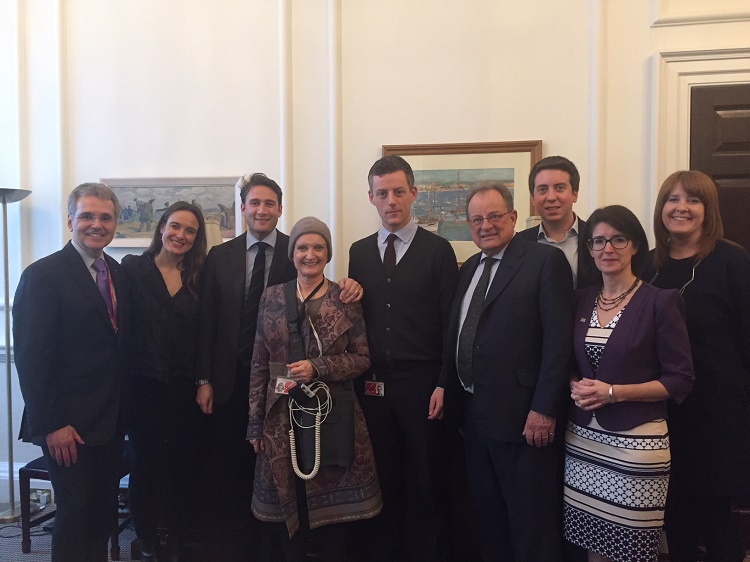Category: Research
-

Nine brain tumour centres awarded Centre of Excellence status
New ‘Tessa Jowell Centre of Excellence’ status recognises delivery of outstanding care and treatment by NHS staff in their efforts to provide above excellent patient care through a difficult time
-

Developments in cannabis-based drug trial for glioblastomas
The Brain Tumour Charity responds to trial suggesting cannabis-based drug could be combined with chemotherapy in recurrent glioblastomas
-

Research at risk
We are calling on the Prime Minister to protect charity funded research – and we need your help!
-

Promising developments for paediatric low grade glioma drug
Our researchers from The Everest Centre have new results that show the drug trametinib can stop tumour growth in some children with low grade brain tumours, in some cases the tumour was seen to shrink as well.
-

Brain tumour AI helping others
Artificial intelligence (AI) may be the key to fast and consistent renal cell tumour diagnoses, all because of work we fund on brain tumours.
-

Shining a light on the differences between glioblastoma cells
A new publication from one of our research projects shines a light on the differences between the cells in the middle/core of a glioblastoma (GBM) compared to the cells spreading/infiltrating into healthy brain around the tumour.
-

Picking up the pace of meningioma research
Dr Gelareh Zadeh is leading research in Canada which will help predict the risk of meningioma regrowth.
-

Announcing our new multi-million pound investment into research
Many things are uncertain right now, but our commitment to research isn’t one of them.
-

Our free research webinars bring the research community together in lockdown.
The Brain Tumour Charity is curating and facilitating a series of 60-minute webinars for researchers. The webinars feature experts in the brain tumour field speaking on a wide range of current topics.
-

Focused ultrasound shows early promise in glioblastoma brain tumours
Researchers are pioneering a promising use of focused ultrasound against glioblastoma, an aggressive brain tumour.
-

Researchers develop a new ‘liquid biopsy’ blood test to accurately diagnose certain types of primary brain tumour
Researchers have developed a new ‘liquid biopsy’ blood test to diagnose brain tumours, which could reduce the need for invasive procedures.
-

Researchers identify genes that can drive development of brain tumours
The human genome contains nearly 22,000 genes and various studies have explored the nearly 2% of DNA that creates proteins. Far less is known about the remaining 98% of DNA that does not encode protein.
-

Artificial Intelligence improves Brain tumour diagnosis
A new machine learning approach can classify gliomas, a common type of brain tumour, into low or high grades with almost 98% accuracy, researchers report in the journal IEEE Access.
-

Australia to begin ground-breaking trial in children with brain cancer
Australia is joining the clinical trial to test a new treatment in children with brain cancer. The trial will be led by Sydney Children’s Hospital.
-

An update on our research into children’s brain tumours
Researcher Todd Hankinson and his team at Children’s Hospital Colorado have studied biological differences between paediatric and adult ACP tumours
-

Committed to funding world-class research into brain tumours
COVID-19 has dramatically transformed the research landscape for our community but we remain driven to accelerate new treatments.
-

Our researchers develop new test to assess drugs to tackle childhood brain tumours
Researcher Till Milde and his team from the Hopp Children’s Cancer Center Heidelberg (KiTZ) have developed a new test system.
-

The National Institute for Health Research announces framework for restarting vital studies
The NIHR announced yesterday that they have published a framework for restarting research activities that have a been paused as a result of Covid-19.
-

Announcing the Tessa Jowell Centres of Excellence
This collaborative plan will award outstanding neuro-oncology centres ‘Tessa Jowell Centre’ status within weeks.
-

The Brain Race announces winning startups in position to defeat brain tumours
The Center for Advancing Innovation (CAI) announces winners of the Brain Race, an open innovation contest to advance high-impact inventions and solutions to defeat brain tumors.
-

Our co-funded study could see babies with brain cancer “spared chemotherapy”.
Scientists carried out a large-scale study of 241 infants from around the world.
-

A unique opportunity to engage with our world-leading research
Last week, our first lab tour of 2020 gave some of our supporters a chance to witness our funded research first-hand.
-

Development of a new blood test for GPs to accelerate early diagnosis.
An affordable, point of care blood test to diagnose brain tumours was announced today by The University of Bristol.
-

The future of European scientific research
On January 31, the UK formally left the European Union (EU). As a result, we have now entered into an 11-month transition period, as the future UK-EU relationship is negotiated.